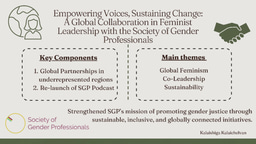LiA Week 4 Log
This week was a dynamic one, with my efforts split between expanding SGP’s global reach through potential partnerships and continuing to build momentum on the podcast project. Both tasks, though different in nature, shared a common goal: to amplify SGP’s impact and ensure that our work is accessible and meaningful to as many people as possible.
On the partnership front, I focused on researching institutions in the Global South and other underrepresented regions. The aim was to identify post-secondary schools with fewer resources but significant potential—places where a partnership with SGP could provide students with leadership opportunities and access to a global network that might otherwise be out of reach. The idea of increasing SGP’s membership by connecting with these institutions felt especially important. We want to offer students in these regions the chance to become leaders in their communities, and joining SGP could be a key part of that journey.
As I delved into this research, I was struck by the variety and richness of educational environments across these regions. Each institution has its own unique challenges and strengths, and I found myself thinking carefully about how we could tailor our partnerships to meet their specific needs. This isn’t about imposing a one-size-fits-all model; it’s about building relationships that are mutually beneficial and sustainable. I’m excited to see how these potential partnerships could open up new opportunities for both SGP and the students involved.
In addition to the partnership research, I continued to work on the podcast re-launch. This week, we took a big step forward by starting the outreach to potential interviewees for our first episode, which will focus on co-leadership. Our goal is to interview the founding members of SGP, as their insights and experiences are crucial to telling the story of how the organization has embodied feminist principles in its leadership structure.
I finalized the interview questions with my supervisor, ensuring that they would guide the conversation in a way that’s both informative and engaging. These interviews are going to be the heart of our first podcast episode, so it was important to get the questions just right. Alongside this, I created a set of instruction manuals to support the team members who volunteered to conduct interviews. These documents included a Podcast Interview Preparation Sheet, which provides guest orientation guidance; a Host Instruction Sheet, to ensure smooth and consistent hosting across different team members; and a Pros/Cons of Podcast Platforms document, which outlines the best tools available for our needs.
Creating these resources was about more than just ensuring that the interviews go smoothly—it was about making the podcast production process as accessible and straightforward as possible for everyone involved. Given that our team is spread across different regions and has varying levels of experience with this kind of work, I wanted to make sure that everyone felt supported and equipped to contribute effectively.
Reflecting on this week, I’m feeling a mix of satisfaction and anticipation. We’re laying down the foundations for both the podcast and our new partnerships, and it’s exciting to see these projects start to take shape. The podcast, in particular, is moving from the planning phase into something tangible, and I’m eager to see how our first interviews turn out.
Looking ahead, I’m focused on continuing to refine the podcast process and beginning outreach to the institutions we’ve identified for potential partnerships. Both projects are challenging in their own ways, but they’re also incredibly rewarding. This week has reminded me of the importance of thoughtful preparation and clear communication, both of which are essential to making these initiatives successful.

Please sign in
If you are a registered user on Laidlaw Scholars Network, please sign in